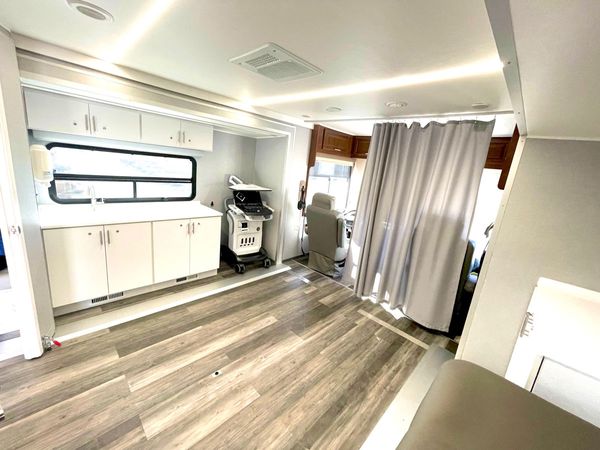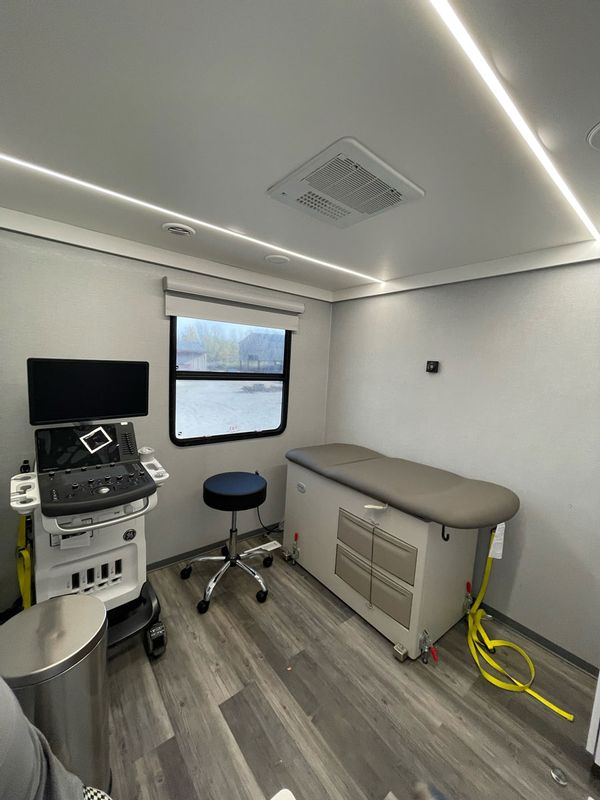
As the Democratic National Convention takes place in Chicago, delegates and attendees don't only have the opportunity to participate in ceremonial political traditions — but they can also get a free vasectomy or medication abortion. That’s because Planned Parenthood’s mobile abortion clinic has been parked blocks away from the event, making headlines and causing some mixed reactions. Representative Majorie Taylor Greene, (R-Ga.), wrote on X that the clinic is “hard to even comprehend” and “truly heartbreaking.”
But despite being viewed by some as a political statement, or even controversial by some, mobile abortion clinics have played a key role in the post-Dobbs landscape: they’ve helped to reduce travel times for women who have to travel out of state to access abortion care.
“Health care has changed so much in the last couple of years, certainly starting with COVID and now exacerbated by the abortion access crisis,” Dr. Colleen McNicholas, the chief medical officer at Planned Parenthood of the St. Louis Region and Southwest Missouri in St. Louis, told Salon in a phone interview. “I think providers need to be thoughtful about how we are pivoting and how we are making our services more accessible.”
In October 2022, Planned Parenthood announced it was launching its first mobile abortion clinic to increase access at red-state borders. The goal was to reduce the hundreds of miles that people may have to travel in light of restrictive abortion laws. At the mobile clinic, which was set up inside an RV, Planned Parenthood clinicians offered consultations and dispensed medication abortion pills. It includes a tiny waiting area, a laboratory, and a couple of exam rooms.
McNicholas said while the mobile clinic that’s at the DNC this week has been parked at the border of Southern Illinois, where it has seen patients from over 28 states over the last two years.
“Illinois has certainly become a haven state for so many across the country,” McNicholas said. “Illinois is surrounded by states on nearly every border that has either severely restricted or eliminated abortion access.”
According to May 2024 data from Guttmacher Insitute, the number of patients traveling to obtain abortion care has doubled over the last few years. In 2020, it was estimated that one in 10 patients traveled for abortion care; in the first half of 2023, it was one in five. Guttmacher attributes this surge in travel to post-Dobbs abortion bans, reporting the most dramatic increases in out-of-state patients occurred in Colorado, Illinois, Kansas and New Mexico.
In April, data analysis from the Center for American Progress (CAP) found that people driving the longest distances to get an abortion were more likely to come from congressional districts with Republican representatives or have lower incomes.

On top of having to lose wages at work, they’re potentially paying for gas, hotels and dealing with long lines to get abortion care. For those who are mothers already, they are struggling to arrange childcare.
Guttmacher Institute also reports that more people are getting care in different ways, like ordering medication abortion online and managing their abortions at home. While brick-and-mortar abortion clinics still account for 80 percent of clinician-provided abortions, the number of brick-and-mortar clinics in the U.S. declined by 5 percent between 2020 and March 2024.
Dr. Josie Urbina, an OB-GYN and complex family planning specialist at the University of California-San Francisco, told Salon that mobile abortion clinics have become a “necessity” in meeting peoples’ reproductive needs post-Dobbs. In part because they can meet people where they are and serve patients in rural and underserved areas. It also adds a layer of confidentiality.

“I'm sure because the anti-abortion movement knows where every abortion clinic is within the U.S., being mobile allows people some confidentiality and that safety that they seek when getting abortion care,” Urbina said. “They don't necessarily have an established address, so they can pick up and move according to the local climate.”
And it’s not just mobile abortion clinics that are gaining popularity. Prenatal maternity care clinics are becoming part of a solution to maternity care deserts in the United States.
“I think this idea of mobile abortion clinics, is so refreshing and innovative, it's an ingenious idea,” Urbina said. “And this type of access should be free to everybody, without barriers.”
In Chicago, McNicholas said the mobile clinic saw 10 patients the first day, and had 15 appointments the next day.
“We have heard stories from patients yesterday, for example, of men who have been looking for and trying to get vasectomy care for years, but because of insurance status or the cost of the care, they've just been unable to access it,” McNicholas said. “It really is a good demonstration that when you have a state that has health care policies that are grounded in science, and allows providers to be flexible and nimble and meet patients where they are, that we can really do some things to help close health care gaps.”
But when it comes to abortion care, while mobile care clinics have been key in this post-Dobbs crisis, McNicholas said the hope is that access can be restored nationwide.
“We need to continue to normalize abortion as part of everyday health care, so that when a patient needs it, they can go to the closest of their healthcare providers to be able to access care,” McNicholas said.







